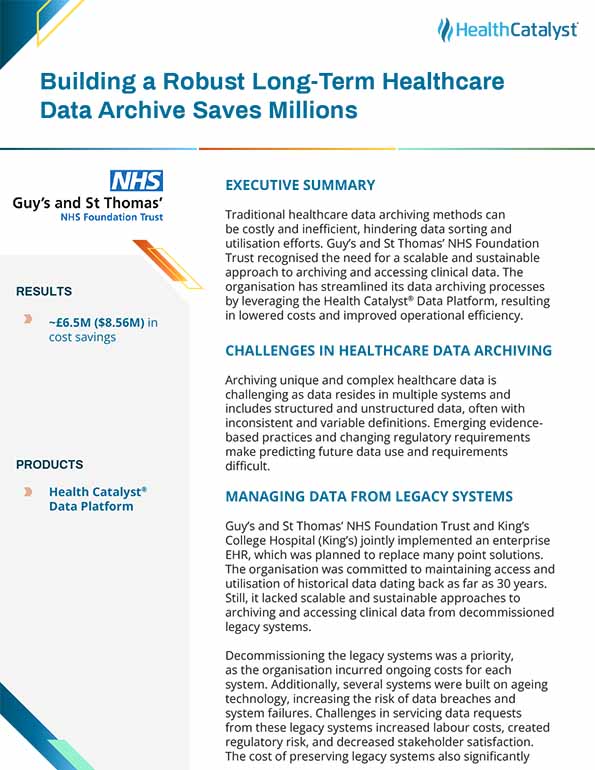Traditional healthcare data archiving methods can be costly and inefficient, hindering data sorting and utilisation efforts. Guy’s and St Thomas’ NHS Foundation Trust recognised the need for a scalable and sustainable approach to archiving and accessing clinical data. The organisation has streamlined its data archiving processes by leveraging the Health Catalyst Data Platform, resulting in lowered costs and improved operational efficiency.
Archiving unique and complex healthcare data is challenging as data resides in multiple systems and includes structured and unstructured data, often with inconsistent and variable definitions. Emerging evidence-based practices and changing regulatory requirements make predicting future data use and requirements difficult.
Guy’s and St Thomas’ NHS Foundation Trust and King’s College Hospital (King’s) jointly implemented an enterprise EHR, which was planned to replace many point solutions. The organisation was committed to maintaining access and utilisation of historical data dating back as far as 30 years. Still, it lacked scalable and sustainable approaches to archiving and accessing clinical data from decommissioned legacy systems.
Decommissioning the legacy systems was a priority, as the organisation incurred ongoing costs for each system. Additionally, several systems were built on ageing technology, increasing the risk of data breaches and system failures. Challenges in servicing data requests from these legacy systems increased labour costs, created regulatory risk, and decreased stakeholder satisfaction. The cost of preserving legacy systems also significantly reduced the value of the EHR.
As a result, Guy’s and St Thomas’ and King’s attempted to build an in-house solution, but increasing costs and complications slowed development time. The organisations needed a rapid solution to preserve historical data, making it readily available for long-term legal inquiries, records requests, research, and data science.
Guy’s and St Thomas’ long-term archive and data accessibility needs were solved by partnering with Health Catalyst to ingest numerous sources identified for decommissioning into the Health Catalyst Data Platform. Previous experience with Health Catalyst and its data integration, warehousing, and advanced analytics increased confidence that the organisation could efficiently ingest large amounts of complex data from various source systems, meeting the aggressive timelines for source system decommissioning whilst maintaining access to unaltered source data.
The data platform offered many advantages compared to cold storage; Guy’s and St Thomas’ was able to continue accessing the data. The archived data are accurate, unaltered, and securely stored in a modern, reliable system, ensuring that care teams and organisational processes dependent upon historical data are not disrupted. Additionally, archived data are readily available for legal inquiries, record requests, research, and analysis. The analysts at Guy’s and St Thomas’ efficiently built analytics applications to visualise data and provide comprehensive reports without data retrieval delays, increasing end-user access to meaningful data and analysis.
By leveraging the data platform, Guy’s and St Thomas’ created a robust, scalable, and cost-effective long-term healthcare data archiving system that supports the organisation in improving patient outcomes and operational efficiency. The long-term archive solution was built in just 90 days, aggregating data from 60 source systems—double the number of source systems initially identified for decommissioning. Analysts built out a dashboard to visualize data in just six days. Guy’s and St Thomas’ has realised:
Additionally, Guy’s and St Thomas’ already had success accessing and using the archived data. The organisation was presented with an urgent request for a bulk data extract for patients participating in a research study. In less than one week, the team was able to provide over 10,000 fully anonymised, cleaned, and validated data points—including vital sign and laboratory data—from the legacy systems.
“Partnering with Health Catalyst enabled us to create a scalable, cost-effective data archiving solution in just 90 days, yielding approximately £6.5M in savings.”
- Jan Vermeer, MBA, BS, Commercial & Sourcing Director, Digital and Technology Services, London NHS Trusts, Guy’s & St Thomas’ NHS Foundation Trust
Guy’s and St Thomas’ plans to build more analytics and create solutions for use cases, including robust analytics and research. The organisation has also identified 70 additional source systems it plans to aggregate into the data platform.


